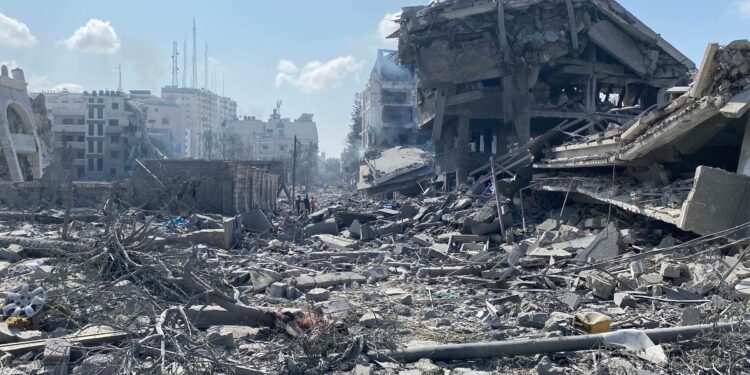The recent Israeli air strike that killed seven aid workers from World Central Kitchen (WCK) has caused the organization to pause its operations, leaving many Palestinians in the Gaza Strip wondering how they will be able to feed their families. This tragic event has also led to the suspension of work by Anera, a US charity that was working in conjunction with WCK. Together, they had been providing two million meals a week across the Palestinian territory, where an estimated 1.1 million people are facing catastrophic hunger due to Israeli restrictions on aid deliveries and the ongoing hostilities.
WCK’s decision to pause its work has also led to the “freezing” of a maritime aid corridor from Cyprus, which the charity helped set up to increase aid flow into the north of Gaza and prevent a looming famine. The aid convoy was hit as it traveled south along the Israeli-designated coastal aid route, after unloading food from a barge at a warehouse in Deir al-Balah. The strike has had a profound impact on the aid system in the region and left it “on the brink,” according to the Norwegian Refugee Council.
WCK accused the Israeli military of a “targeted attack” on vehicles clearly marked with the charity’s logo and whose movements had been coordinated with Israeli authorities. The victims of the strike included individuals from various nationalities, including British, Polish, Australian, and Palestinian, as well as a dual US-Canadian citizen. Despite the military’s acknowledgment of a “grave mistake” and promises to improve the protection of aid workers, aid groups remain skeptical and assert that this incident was not isolated.
The strike has prompted other US-based organizations, such as Project Hope and International Medical Corps, to reassess their safety protocols and consider restricting their workers’ movements. This has raised concerns about the long-term consequences for the people of Gaza, as aid organizations may be forced to pull out, exacerbating the already dire humanitarian situation.
The safety and security of aid workers in Gaza has become a major concern, with organizations like the Palestinian Red Crescent and Medical Aid for Palestinians expressing fear and uncertainty about continuing their operations. Despite the challenges and risks, many Palestinian aid workers remain committed to delivering aid to those in need, emphasizing the importance of providing assistance even in the face of danger.
Amidst these challenges, the international community has been urged to push for a humanitarian ceasefire to allow aid organizations to scale up their response in Gaza. The UN agency for Palestinian refugees (UNRWA) has also called for a “complete reversal in policies” from Israel, including lifting the ban on aid deliveries to northern Gaza. These calls for action underscore the urgent need for concerted efforts to address the humanitarian crisis in the region.



























